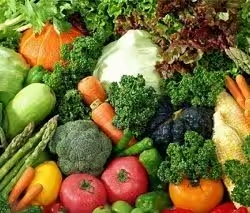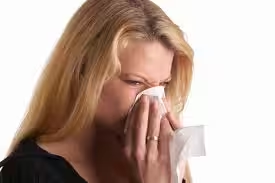(646) 760-6627

Allergy season 2012 has arrived early, much to the chagrin of the 40 million people who end up sneezing, wiping their runny noses and grappling with itchy, watery eyes, among other symptoms. With researchers declaring spring 2012 the worst allergy season yet, is it possible for the typical sufferer to imagine life without daily doses of Claritin or Zyrtec? The answer, from what I’ve found in practice, is a resounding yes. As a naturopathic doctor, I seek to treat the cause of disease, rather than simply abolish symptoms, the reason being that quelling symptoms doesn’t eradicate the source of the disease process. So the imbalance in the body will simply move somewhere else: the skin, the gut, or the nervous system to name a few. Those things drug companies call ‘side effects’: that’s what I’m referring to. Here’s a quick and dirty guide to arresting allergies before they even begin.
1. Tend to the gut: Your digestive system is the biggest barrier between you and your environment. Whenever you eat something or put an object in your mouth (thoughtfully chewing your pen while you read this), pathogens enter your body. It’s up to your hard-working gut to process all of this junk. To get slightly scientific, the mucosal layer of the GI tract is in three parts: the cells of the gut, a mucous layer and gut bacteria, the latter of which weighs three pounds and numbers 100 trillion. We naturopaths like to call this your garden and to keep your little patch healthy and strong enough to protect against invaders that will trigger an allergic immune response. It’s important to take strong probiotics, which have been clinically shown to reduce symptoms of hay fever.
2. Support the liver: This almighty organ is responsible for detoxification. It filters all the blood and makes toxins soluble for excretion from the body. When the liver becomes overwhelmed by pathogens, it becomes less efficient, and allergy symptoms worsen. Take some milk thistle and NAC (n-acetylcysteine) to support it.
3. Treat the adrenals: These little guys sit atop the kidneys and are only about as big as almonds, but their impact is huge. They secrete the stress hormone cortisol, which, in its synthetic forms of hydrocortisone or prednisone, is sometimes used by conventional docs to treat seasonal allergies. Bypass the need for taking extra cortisone by ensuring that your adrenals are producing enough naturally: Vitamin C, Vitamin B and the herbs Siberian ginseng, licorice and ashwagandha will do just that.
And, lastly, eating right is key. This isn’t exactly treating the cause but food is, unquestionably, the best medicine we have and none of my patients walk away without nutrition recommendations.When it comes to treating allergies with food the goals are simple: first, consume antioxidant-rich items to scavenge allergens and second, dine on fare that decreases histamine production. Eat colorfully during allergy season to get a range of bioflavanoids with their megadoses of antioxidants: red, orange, yellow, and green veggies along with liberal sprinklings of sunflower seeds and wheat germ (if tolerated well). Quercetin is the king of natural anti-histamines and it’s plentiful in onions, garlic, kale, scallions and green tea. Starting any or all of these suggestions now will definitely decrease the annoying and even life-interrupting symptoms that arrive this time of year and next year, get a jumpstart by beginning, oh, mid-January because who knows how soon allergy season will start in 2013.


